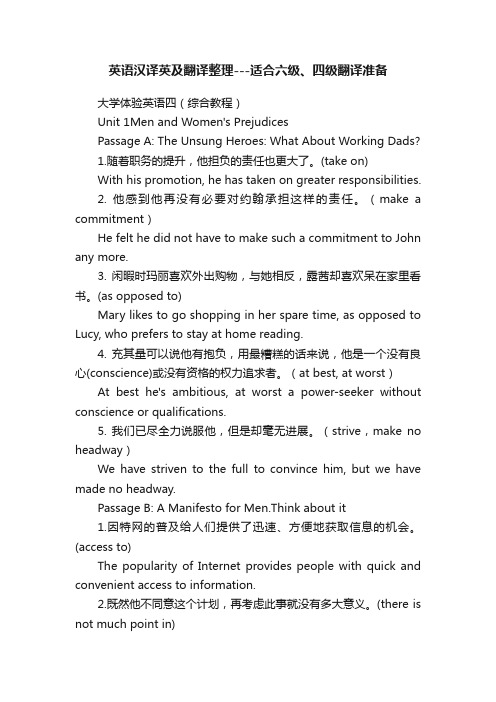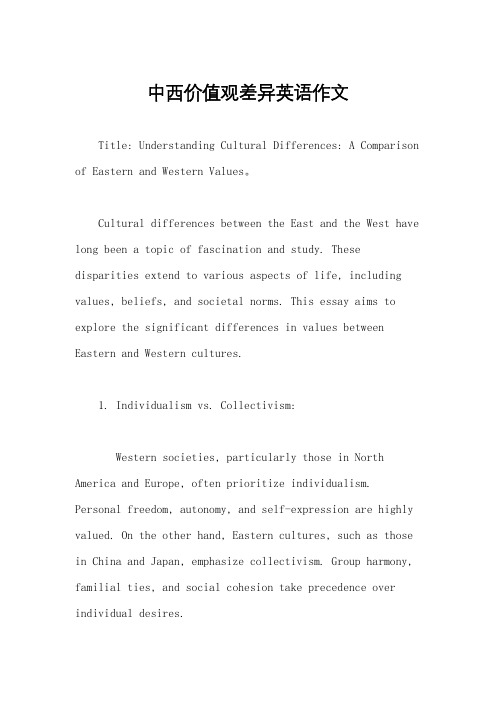A comparison of cultural differences between Chine
英语汉译英及翻译整理---适合六级、四级翻译准备

英语汉译英及翻译整理---适合六级、四级翻译准备大学体验英语四(综合教程)Unit 1Men and Women's PrejudicesPassage A: The Unsung Heroes: What About Working Dads?1.随着职务的提升,他担负的责任也更大了。
(take on)With his promotion, he has taken on greater responsibilities.2. 他感到他再没有必要对约翰承担这样的责任。
(make a commitment)He felt he did not have to make such a commitment to John any more.3. 闲暇时玛丽喜欢外出购物,与她相反,露茜却喜欢呆在家里看书。
(as opposed to)Mary likes to go shopping in her spare time, as opposed to Lucy, who prefers to stay at home reading.4. 充其量可以说他有抱负,用最糟糕的话来说,他是一个没有良心(conscience)或没有资格的权力追求者。
(at best, at worst)At best he's ambitious, at worst a power-seeker without conscience or qualifications.5. 我们已尽全力说服他,但是却毫无进展。
(strive,make no headway)We have striven to the full to convince him, but we have made no headway.Passage B: A Manifesto for Men.Think about it1.因特网的普及给人们提供了迅速、方便地获取信息的机会。
大学英语精读课文mypersonalmanager

01 Introduction
Theme Introduction
Overview of the Textbook
"College English Intensive Reading Texts" is a comprehensive textbook designed to improve students' reading comprehension and vocabulary in English
Interpretation of Long and Diffluent Sentences
目 录
• Exploration and Inspiration of the Theme and Ideology of the Article
• Reflections from the Perspective of Cross Cultural Communication
04 Key vocabulary and phrase analysis
Key vocabulary
01
Intense
meaning 'very through and careful', used to describe the focus on detailed reading and analysis in this course
and academic, with a focus on
objective
and
neutral
language
Main content summary
Introduction: The article begins with an introduction to the topic of College English Intensive Reading Text and its importance in language learning
(文化方向)的英语专业毕业论文选题参考题目

目 录
• Exploration of the Relationship between Language and Culture
• Development of tourism and cultural industry
The Impact of Language Div…
Analyzing the Role of Different Languages in Maintaining and Developing Cultural Diversity.
The impact of language extinction on cultural heritage
03
Exploring the Cross Cultural Communication of Chinese Online Literature Abroad
04
Analysis of cross-cultural communication strategies for international brands in the Chinese market
Research successful cases and lessons learned from Chinese film and television works in the international market, such as indepth understanding of the target market, integration with local culture, and effective promotion methods.
中西价值观差异英语作文

中西价值观差异英语作文Title: Understanding Cultural Differences: A Comparison of Eastern and Western Values。
Cultural differences between the East and the West have long been a topic of fascination and study. These disparities extend to various aspects of life, including values, beliefs, and societal norms. This essay aims to explore the significant differences in values between Eastern and Western cultures.1. Individualism vs. Collectivism:Western societies, particularly those in North America and Europe, often prioritize individualism. Personal freedom, autonomy, and self-expression are highly valued. On the other hand, Eastern cultures, such as those in China and Japan, emphasize collectivism. Group harmony, familial ties, and social cohesion take precedence over individual desires.2. Hierarchy and Authority:Western cultures typically exhibit a moreegalitarian approach, where individuals expect to betreated as equals regardless of social status. In contrast, Eastern societies often respect hierarchical structures and authority figures. Respect for elders, teachers, andleaders is deeply ingrained in Eastern value systems.3. Time Orientation:Western cultures tend to adopt a future-oriented perspective, emphasizing planning, efficiency, and progress. In contrast, Eastern cultures often prioritize the past and present, valuing traditions, history, and the maintenanceof social equilibrium. This is evident in practices such as ancestor worship and the preservation of cultural heritage.4. Communication Styles:Western communication tends to be direct, explicit,and assertive, with an emphasis on individual opinions and expression. In contrast, Eastern communication often involves implicit cues, indirectness, and a focus on maintaining harmony and saving face. Silence and nonverbal cues are often as significant as spoken words in Eastern contexts.5. Attitudes Towards Change:Western cultures generally embrace change and innovation, viewing them as catalysts for progress and improvement. Conversely, Eastern cultures may exhibit more resistance to change, valuing stability, continuity, and preserving established social structures. This can lead to slower adoption of new ideas and technologies.6. Concept of Success:In Western societies, success is often equated with individual achievement, wealth, and status. The "American Dream" epitomizes this pursuit of personal prosperity and upward mobility. In contrast, Eastern cultures may placegreater emphasis on collective success, familial honor, and social recognition rather than individual accomplishments.7. Relationships and Social Networks:Western cultures tend to prioritize a larger circle of acquaintances and may value personal space and privacy. Relationships are often more fluid and based on shared interests or experiences. In contrast, Eastern cultures emphasize close-knit relationships with family, extended relatives, and long-standing social networks. Maintaining strong interpersonal bonds and loyalty within these networks is paramount.8. Attitudes Towards Nature and the Environment:Western societies often exhibit a utilitarian view of nature, viewing it as a resource to be exploited for human benefit. Environmental conservation efforts are typically driven by concerns for future generations and the preservation of biodiversity. In Eastern cultures, there may be a more holistic and reverential approach to nature,with an emphasis on harmony, balance, and the interconnectedness of all living things.In conclusion, while there are undoubtedly numerous similarities between Eastern and Western cultures, the differences in values are significant and shape various aspects of societal norms, behaviors, and attitudes. Understanding and appreciating these differences can foster greater cross-cultural understanding and cooperation in an increasingly interconnected world.。
九年级英语Unit7Wherewouldyouliketovisit(SectionB2)

Interpretation of key paragraphs
Key paragraph 1
Introduce the topic of travel and discuss the importance of experiencing new places and cultures
Key paragraph 2
01
添加标题
Introduction of topics and background introduction
Topic introduction
The topic of this unit is about travel and tourism, specifically focusing on different destinations and places of interest around the world
03
添加标题
Listening training and improvement
Selection and playback of listening materials
Choose appropriate listening materials
Select authentic and varied listening materials such as podcasts, news reports, interviews, and stories related to the theme of the unit
Describe different types of travel destinations, such as cities, beaches, mountains, and historical sites
高职英语综合教程(下册)Unit3Customs

Development of cross-cultural communication skills through role-playing and group activities.
Overview of Unit Theme Content
02
Text explanation
CHAPTER
Gapfilling
Multiple-choice listening
Summarizing and note-taking
Listening comprehension exercises
Have students engage in simulated real-life scenarios where they must use English to communicate effectively.
Case analysis of cross-cultural communication
01
02
03
Expressing Greeting
Learn to use appropriate greetings according to different cultural contexts, such as formal and informal situations, different time of the day, and special occasions.
Role-playing activities
Encourage students to express their opinions and engage in meaningful discussions on relevant topics.
跨文化交际论文参考题目
跨文化交际论文参考题目中西方文化差异的论文题目:中西方时间观念的比较中西方饮食文化的比较中西方教育的比较中西方问候语的比较中西方餐桌礼仪的差异中西方宗教文化对比中西方儿童文学的差异从文字比较看中西方文化差异礼貌中的中西方“面子文化”差异论中西方激励机制的差异比较和在医疗管理中的应用英语教学中的文化教学——中西方文化差异对比分析中西方价值观差异对交际模式的影响从历史中透视中西方经济差异形成的原因浅谈跨越中西方文化障碍日常生活中的中西方文化差异浅析中西方隐私观的差异中西方古代体育和谐思想比较研究中西方传统犯罪控制思想之比较土地与海洋的对话——中西方文化与人格差异之浅见汉英商标翻译与中西方文化差异中西方孝文化探析从文化视角看中西方教育思想的差异中西方语言与文化的差异中西方哲学语言观的差异浅析中西方文化差异对翻译的影响从素质教育看中西方教育的差异及思考中西方立宪文化差异比较——以价值观为视角影响跨文化交际的主要因素——中西方价值观念差异中西方股票期权制度实际操作的差异性分析英美社会与文化论文1. The Contrast and Analyses of Customs in Britain and China英国和中国习俗之研究2. Cultural Connotation of English Names英语姓名的文化内涵3. Black Culture and American English黑人文化与美国英语4. The Phenomenon of “Political Correctness” in American English论美国英语中的政治正确现象5. English Euphemism and Culture文化因素与委婉语6. Cultural Differences in Address Terms: English and Chinese 英汉称呼语中的文化差异7(Influence of Greek Myths to British and American Culture希腊神话与英美文化8. An Investigation on Intercultural Communication Competence and Intercultural SensitivityAmong Chinese College Students关于中国大学生跨文化交际能力和跨文化敏感度的调查9. Cross-Cultural Awareness in Translating Tourist Materials 中国旅游资料翻译中的跨文化意识10. Cross-Cultural Training in Chinese Universities 中国大学中的跨文化培训11. Acculturation Strategies among Chinese Overseas Students 中国海外留学生的文化适应策略12. On Tour Commentary Translation---An Intercultural Communication Perspective从跨文化角度看导游词翻译13. Intercultural Communication on the Internet 互联网上的跨文化交际14. On the Application of Theatrical Tricks to the Shakes peare’s Dramas论莎士比亚戏剧中的舞台技巧的应用15. The Bible and Western Festivals《圣经》与西方节日16. On Culture-loaded Animal Words in Cross-Cultural Communication 跨文化交际中的动物文化词研究17. The Cultural Differences Between Chinese and English from the Cultural Attached Meaningof Animal Words从动物词汇看汉英文化的差异18. On Plants Words and Culture论植物词汇与文化19. On the Cultural Connotations of Color Words in English and Chinese中英颜色词文化内涵研究20. Cross-cultural Communication on the Translation of the Chinese “Long”从中国“龙”字的翻译看跨文化交际21. On English and the Chinese Borrowing Words and the Cultural Differences论中英借用词与文化差异22. A Contrast of the Symbols of American and Chinese Culture中美文化象征比较研究23. The Contrastive Study on the Courteous Expressions in English and Chinese 英汉礼貌用语对比研究24. Body Language in Non-verbal Communication浅谈非语言交际中的身势语25. Culture Consciousness in the English Language Teaching英语教学中的文化意识26. Reinforcing Equality in Cultural Communication in Cross-cultural Communication 跨文化交际应加强文化平等交流意识27. Cross-cultural Difference on the Non-verbal Communication非言语交际的跨文化差异28. Improper Cultural Transferences in Cross-Cultural Communication 文化负迁移对跨文化交际的影响29. On Cross-Cultural Communication Phenomenon论跨文化交际现象30. The Difference of Cultural Thinking Between English and Chinese and the Intercultural Communication英汉文化思维差异与跨文化交流31. Chief Factors Affecting Cross-Cultural Communication--- Difference Between Chinese and Western Values影响跨文化交际的主要因素---中西方价值观念差异32. Taboos in Cross-Cultural Communication--- Probing into the Difference Between Western and Chinese Culture跨文化交际中的禁忌问题---中西方文化差异之探讨33. Cultural Differences in Cross-Cultural Communication Between Chinese and English Language谈英汉跨文化交际中的文化差异34. The Difference of the Eastern and Western Mode of Thinking and Cross-Cultural Communication中西思维模式差异与跨文化差异35. Cross-Cultural Communication in Interpretation口译中的跨文化交流36. The Cultural Perception and Memory in Intercultural Communication 跨文化交流中的文化感知和文化记忆37(Cultural Factors of English Catchwords英语流行语的文化因素38(The Epitome of Contemporary American History and Culture--- Interpreting Forrest Gump 当代美国历史和文化的缩影---解读《阿甘正传》39. Body Language in Non-verbal Communication浅谈非语言交际中的身势语40. Differences and Resources of Addressing in English 英汉语中称谓的差异及其成因41. Cultural Interpretations of English and Chinese Names 英汉姓名的文化阐释42. Different Body Languages in Different Cultures身势语在不同文化下的差异43. Functions of Non-verbal Behavior in Intercultural Communication 非言语行为在跨文化交际中的功能44. The Contrastive Study on the Courteous Expressions in English and Chinese 英汉礼貌用语对比研究45. The Presentation of Different Thinking Modes in Chinese and Western Religious Cultures中西方宗教文化中的不同思维模式46. The Breath of American Slang美国俚语初探47. The Influences of Western Festivals on Chinese Society 西方节日对中国社会的影响48. Cultural Migration of Western Festivals西方节日的文化入侵49. The Influence of Borrowing Words on English and Chinese Vocabulary英汉词语互借对语言文化的影响50(Cross-Cultural Communication in Business World商务领域跨文化现象51(Christianity and American Culture基督教与美国文化52. The Studies of Chinese Movies and Culture中国电影与文化53. Cultural Implication of Chinese Cuisine中国饮食文化的内涵54. Diversities of Chinese and Western Culture from the Sources of English and Chinese Idioms从汉英习语来源看中西方文化的差异55. The Social Status of the Blacks in America after the Civil War美国内战后的黑人社会地位56. A Comparison of Garments Culture between the East and the West 中西服饰文化对比57. A Research on Cross-Cultural Difficulties in Reading Comprehension 影响阅读理解的跨文化因素研究58. The Reasons of Ancient Greek Mythology Influencing the English Language 古希腊神话故事对英语语言影响的原因59. A Cultural Perspective on Chinese and Western Trademarks 中西方商标的文化视角60(English Idioms and the Western Culture英语习语和西方文化61. A Tentative Study on English and Chinese Euphemism 汉英委婉语研究62(American Place Names and Their Culture美国地名和文化63(A Comparison of Courtesy Conventions between Chinese and English 汉英礼貌用语的异同64(Animal Words in Chinese and English Idioms and Their Translations 中英习语动物词异同及其翻译65. Cultural Differences on Etiquette between China and Western Countries 中西方礼仪文化差异66(Increasing Cultural Awareness of Secondary School Students 如何提升中学生的文化意识67(A Comparative Study of Compliments: Cross-Culture Perspectives 从跨文化的角度对比中西方问候语的差异原文已完。
英语翻译论文题目
On Translation of English Neologism浅谈英语新词的译名
Chinese Translation Skills of English Business News英语经济新闻汉译技巧
An Analysis of Common Errors and the Standard Translation of Office Signs办公室标示语翻译中常见错误的分析及翻译规范
A Comparative Study of the Two English Versions of Teahouse《茶馆》两个英译本的比较研究
A Review of the Cultural Differences Between China and America -Based on the Comparison of Obama and Hu Jintao's Speeches从奥巴马与胡锦涛的演说审视中美文化差异
A Comparative Study of the Two Chinese Versions ofThe Art of Life《生活的艺术》两个汉译本的比较研究
On the Contextual Adaptation Theory Embedded in Film Title Translation
关于语境适应论在电影片名翻译中的嵌入
A Study on English Translation of Chinese Idioms from a Memetic Perspective模音论视角下汉语习语英译探究
On E-C Translation of Brand Names from Perspective of Functional Equivalence从功能对等理论看英文商标的汉译
英语论文题目大全
英语论文题目大全(中英)1.《红字》中海丝特? 白兰不理智的一面(The Irrational Side of Hester Prynne of The Scarlet Letter)2. 《董贝父子》中的矛盾冲突(The Conflict in Donbey and Son)3. 论文化不同对联想意义及翻译的影响(On Influence of Cultural Differences on Associative Meanings and Translation)4. 美国教育的衰弱(The Drop of American Education)5. 19世纪欧洲移民对美国工业化的积极影响(The Positive Impacts of European Immigration on American Industrialization in the 19th Century)6. 朱丽叶之人物分析(Character Studies in Juliet)7. 主述理论在文学中的运用(The Application of the Thematic Theory in Literature)8. 语用学中的会话含义理论(Conversational Implicature Theory in Pragmatics)9. 英语语音简析及对提高初学者口语的指导(A Brief Analysis of English Phonetics as well asa Guide to Improve Learners’ Oral English)10. 比较两种对于哈姆雷特复仇的评论(Comparison on Two Kinds of Comments on Hamlet’s Revenge)11. 英语语言中的性别歧视(Sexism in English Language)12. 英语的学与教(English Learning and Teaching)13. 由美国2004年总统选举所想到的(More than 2004 Presidential Election)14. 论腐朽世界中的纯洁品质——关于《雾都孤儿》的赏析(The Purity in a Corrupt World—An Analysis of Oliver Twister)15. 论理智与情感之关系——对《理智与情感》的人物分析16. 入世对中国银行业的挑战(Challenges on Chinese Banking Sector after Entering the WTO)17. 西进运动对美国的影响(The Influences of Westward Movement on America)18. 史蒂芬?克拉申的听读假设和二语习得(Stephen Krashen’s Input Hypothesis and Second Language Acquisition)19. 艾?巴?辛格——犹太文化的守护者(L. B. Singer—the Patron of Jewish Civilization)20. 二十世纪60年代美国妇女运动的派别(The Politics of American Women’s Movement in the 1960’s)21. 论《红字》的模糊性(Ambiguity in The Scarlet Letter)22.《嘉莉姐妹》中无心的欲望(The Limitless Desires in Sister Carrie)23. 英语广告语言修辞特点(Rhetorical Features in Advertising English)24.《儿子与情人》中的恋母情结(Pau Morel’s Oedipus Complex in Sons and Lovers)25. 造成苔丝悲剧命运的原因(The Reasons for Tess’s Tragic Fate)26. 论恐怖主义的根源(On the Root of Terrorism)27. 2003: 中印关系新纪元(2003: A New Era of Sino-India Relationship)28. 希兹克利夫的复仇(The Revenge of Heathcliff)29. 弗洛伊德理论对美国现代文学的影响(The Influence of Freudian Theory on ModernAmerican Literature)30. 论萨姆一家人之“变形” (The Etamoephosis of the Samsas)31. 亚伯拉罕? 林肯的民主思想初探(A Preliminary Research on Abraham Lincoln’s Thought of Democracy)32. 评析《傲慢与偏见》的男主人公达西(Mr. Darcy in Pride and Prejudice)33.《简爱》的圣经情书(The Relationship Between Jane Eyre and the Bible)34. 库区三角浮出水面——万州、开县、云阳经济宏图(The Triangle of Reservoir Region Is Surfacing—Wanzhou, Kaixian and Yunyang Open a Great Diagram of Economy)35. 会话中的合作原则和礼貌原则(Cooperative Principle and Politeness Principle in Conversation)36. 浅析海明威笔下圣地亚哥与其它主人公之异同(Analysis of the Similarities and Differences Between Santiago and Other Heroes by Hemingway)37. 对嘉尔曼的偏见(The Prejudice Against Carmen)38. 简爱——关于简爱的性格评论(Jane Eyre—A Review of Jane Eyre’s Character in Jane Eyre)39. 《呼啸山庄》中凯瑟琳和希斯克力夫之间的苦痛恋情(The Suffering Love Between Catherine and Heathcliff in Wuthering Heights)40. 简评妥协——研究《傲慢与偏见》(A Brief Comment on the Compromise—A Study of Pride and Prejudice)41. 《傲慢与偏见》中的婚姻面面观(Analysis of the Marriages in Pride and Prejudice)42. 试论简奥斯汀生活对其小说的影响(On the Impact of Jane Austen’s Life on Her Novels)43. “真实的诺言”与传统文化的碰撞——简析“真人秀”的实质和本地化过程(When True Lies Challenge Tradition—An Analysis of the Reality and Localization of Reality TV)44. 从台湾问题看中美关系(The Sino-US Relation—The Taiwan Issue)45.《傲慢与偏见》的生命力(The Great Vitality of Pride and Prejudice)46. 平凡中的不平凡——《傲慢与偏见》(Significance in Commonplace—Pride and Prejudice)47. 萨皮尔沃夫理论(Sapir-Whorf Hypothesis)48. 论格里高尔的悲剧(An Analysis of Gregor’s Tragedy)49. 对大学生心理健康问题予更多关注(More Attention to the Psychological Health of College Students)50. 文体学: 语言学习的科学(Stylistics: A Scientific Approach)51. 佛教在西方(Buddhism in the West)52. 非语言交际(Nonverbal Communication)53. 国际反恐(International Anti-Terrorism)54. 全球资金市场近期特征与走向(The Character and Tendency of Global Capital Market in Recent Decades)55. 从《老人与海》中桑堤亚哥的性格可知——人是打不败的(A Man Cannot Be Defeated—From the Character of Santiago in The Old Man and the Sea)56. 南方的失落(The Loss of the South)57. 戏谑与幽默(Banter and Humor)58. 《嘉莉妹妹》中的现实主义和自然主义(Realist and Naturalist Factors in Sister Carrie)59. 论中国的口语教学(On Oral English Teaching in China)60. 浅析英语教育中的文化教学(The Teaching of Cultures in Foreign Language Education)61. 广告社会责任感诉求(Social Responsibility Concern of Advertising)62. 英语中的性别歧视(Sex Discrimination in English Language )63. 电影《乱世佳人》长期受到青睐的原因(Gone with the Wind – Why This Movie Has the Lasting Popularity)64. 广告英语特点分析(An Analysis of Language Features in English Advertisement)65. 美国青少年教育问题浅析(An Attempting Study of the Problems of American Adolescents)66. 简爱自我价值的实现(The Realization of Jane Eyre’s Self-Worth )67. 自由贸易与保护主义(Free Trade Versus Protectionism)68. 如何在课堂上调动学生的积极性(How to Promote Motivation in the Classroom)69. 在英语教学中运用“交际法”提高学生的交际能力(Using CLT in English Teaching to Improve Students’ Communicative Competence)70. 文化差异对跨文化交际的影响(The Influence of Cultural Difference Upon Cross-cultural Communication)71. 论基督教对中世纪早期西欧文化的影响(On Christianity’s Influence Upon European Culture in the Early-stage Middle Ages )72. 《哈克贝利费恩历险记》是一部种族主义小说吗?(The Adventures of Huckleberry Finn-a Racist Novel?)73. 第二语言学习中的文化学习(Culture Learning in Second Language Learning)74. 试论哈姆雷特的两个主题(On the Two Themes of Hamlet)75. 谚语中的文化差异(Cultural Differences in Proverbs)76. 浅谈电视暴力和儿童的关系(TV Violence and Children)77. 《建设有中国特色的大众文化》(Construction of Popular Culture with Chinese Characteristics)78. 理性视角看待当今文化多样性(Rational Perspectives toward Contemporary Culture Diversity)79. 米切尔在《飘》中的思想矛盾(Mitchell’s Ideological Contradiction in Gone With The Wind )80. 浅析马克?吐温作品之《竞选州长》(A Brief Analysis on Mark Twain’s Work Running for Governor)81. 美国霸权的文化诠释(Cultural Interpretation of American Hegemony)82. 中国人学习英语的语音问题(The Phonetic Problems of Chinese Students Learning English )83. 传统的中国文化对中国商业的影响(The Influence of Traditional Chinese Culture on ChineseBusiness)84. 《双城记》中的典型人物角色及其对主题的诠释(The Typical Characters of A Tale of Cities and Their Annotation to The Themes)85. 从儒家理论角度浅谈赡养年老父母的责任(On the Filial Obligation in the Light of the Confucian Theory)86. 消费需求与广告策略(Consumer Need and Advertising Strategies)87. 古埃及女性的地位(The Status of Women in Ancient Egypt)88. 成功的秘诀——电影《阿甘正传》的语言分析(The Secret of Success –Analysis of Forest Gump’s Language)89. 文化全球化和文化民族性(Cultural Globalization and Nationality )90. 儒家文化与现代教育(Confucianism and the Modern Education)91. 委婉语的产生与交际功能(Social Function and Origin of Euphemism)92. 对旅游市场营销的探讨(Tourism Marketing)93. 《黑暗之心》的内容与主题(The Content and Theme of Heart of Darkness)94. 诗词翻译中的4—R翻译理论(On the 4-R Theories in Poetry Translation)95. 词组记忆单词的有效性(Vocabulary Study through Phrasal-learning)96. 伊拉克战争中所体现的美国价值观(The American Values Represented in the Iraq War)97. 实践词汇教学法(Word Teaching through Practice)98. 中国加入世贸组织对于国内旅行社的影响(The Influence on Domestic Travel Agencies of China’s Entry to World Trade Organization)99. 高校校园文化及其建设(College Campus Culture and Its Construction)100. 试析《了不起的盖茨比》里的象征主义手法(Symbolism in The Great Gatsby)101. 大学英语阅读教学中的问题及对策(Reading Teaching in College English :Problems and Measures)102. 口语课堂中引入文化教学(Add Culture Into oral English Class)103. 意外结局的大师——欧?亨利(The Master of Surprising Ending—O?henry)104. 浅析中国女性传播者话语权的突破(On the Breakthrough of Discourse Analysis of Chinese)105. 浅析成都报业市场的竞争及启示(General Analysis of Chengdu Newspaper Market’s Competition and Enlightenment)106. 机遇?挑战?——试谈报纸应对网络的冲击(Opportunity ? Challenge?—The Impact of Internet on Newspaper)107. 菲茨杰拉德:“爵士乐时代”的代言人(F .Scott Fitzgerald : The Spokesman of the Jazz Age)108. 霍桑的善恶观——浅析《红字》中的四个主要人物(Howthoren’s View on Good and Evil –An Analysis of the Four Major Characters in The Scarlet)109. 中美文化差异之集体主义与个人主义(Collectivism and Individualism: Different Cultural Values in China and America)110. 通过人物分析思考《汤姆叔叔的小屋》中的基督教理念(Christianity in Uncle Tom’sCabin as Seen from Character Analysis)111. 中美商业交往文化之差异比较(A Comparative Study of Cultural Differences in Business Communication Between Chinese and Americans)112. 光荣与耻辱——英国足球文化观察(Honor and Disgrace –An Observation of the Football Culture of UK)113.《格列佛游记》中的讽刺手法(Satire in Gulliver’s Travels)114. 狄更斯小说《双城记》中人道主义思想的分析(The Analysis of Dickens’ Humanitarian Sentimentality—After Reading A Tale of Two Cities)115. 《大卫?科波菲尔》的人物分析(An Analysis of Good and Bad Characters in David Copperfield)116. 语言歧义(Language Ambiguity)117. 美国英语变体和身份(English Variety and People’s Identities in the United States)118. 哈代对传统伦理道德观的批判(Hardy’s Criticism on Traditional Ethics and Morality in Tess of the D’Urbervilles)119. 《汤姆?索亚》——对儿童心理的深入分析和充分展现(Tom Sawyer, Full Analysis and Display of Children’s Psychology)120. 从扭曲到恢复——试析《李尔王》中的人性(From Distortion to Resuscitation –An Analysis on Human Native in King Lear)121. 浅谈《美国悲剧》及物质主义的消极影响(An American Tragedy and the Negative Influence of Materialism)122. 情感与语言学习——中学英语学习中焦虑情绪(Affect in Language Learning —Anxiety in Middle-school English Learning)123. 一部反战小说——浅析《永别了,武器》(An Antiwar Novel –An Analysis of the Heroine in Gone with the Wind)124. 哈姆雷特悲剧成因探索(What Bring About the Tragedy of Hamlet)125. 透过《傲慢与偏见》看十八世纪英国绅士特点(Exploring the Traits of English Gentlemen in the 18th Century Through Pride and Prejudice)126. 论双语教育在中国的可行性——透过高新区第一实验小学的调查(The Feasibility of Bilingual Education in China—Through the Research in the NO.1 Experimental Primary School of Chongqing Hi-tech Industry Development Zone)127. 评论中国英语教学与学习(A Review of English Teaching and Learning in China)128. 从广告用语看美国价值观(Advertising Language as a Mirror of American Values)129. 跨文化交际失败的原因(Causes of Breakdowns In Intercultural Communication)130. 《傲慢与偏见》中的次要人物(Minor Characters in Pride and Prejudice)131.《印度之行》的象征意义(Symbolism in A Passage to India)132. 对《动物农庄》的思考——《动物农庄》里的人物象征意义(A Thought on Animal Farm—The Symbolism of the Characters of Animal Farm)133. 美国青少年犯罪与家庭的关系(The Relationships Between Family and JuvenileDelinquency in USA)134. 对于老师在课堂中主体作用的思考(Reflection on The Teacher As Classroom Leader)135. 两性的语言差异(Gender Difference in Language)136. 中西方饮食文化比较(A Comparison Between Chinese and Western Dietetic Cultures)137. “寻找出路,但没有出路”—美国战后青年的缩影“麦田守望者”(“Find Way Out , Yet No Way Out”—A Picture of the Postwar American Youth From The Catcher in the Rye)138. 圣经对西方文化的影响(The Influences of the Holy Bible on the Western Culture)139. 中国妇女地位的变迁(Changes of Women’s Character)140. 《了不起的盖茨比》所体现的“美国梦”的幻灭(The Collapse of the American Dream Represented in The Great Gatsby)141. 略论美国俚语(Remarks on American Slang)142. 从社会透视角度来看中美文化差异(Sino-America Culture Differences from a Social Perspective)143. 论《永别了,武器》中的死亡情绪(On theDeath in A Farewell to Arms)144. 《第二十二条军规》的艺术特色(Artistic Features in Catch-22)145. 《了不起的盖茨比》与美国梦(The Great Gatsby and the American Dream )146. 创造性与课堂中的保创造性思维(Phrase Approach to Vocabulary Learning)147. 文艺复兴发生在意大利的必然性(The Certainty of Renaissance Arising in Italy)148.中学英语中的多媒体技术(Multimedia Technologies in English Language Teaching in Middle School)149. 冲突在文学任务塑造中的运用(On Conflicts in Characterization in Literature – A Character Analysis of the Heroine in Gone with the Wind)150. 欧.亨利式结尾的艺术魅力(The Artistic Charm of O. Henry)。
全新版大学英语课件U2
Teaents
01
Language proficiency
Students are expected to achieve a high level of proficiency in
English, with a focus on accuracy and fluency in both written and
Drawing logical conclusions based on information provided in the text and making connections between ideas.
Cultural awareness
Recognizing and understanding cultural references and differences in language use to enhance comprehension.
Quickly scanning text to identify main ideas and key points.
Scanning
Summarizing
Searching for specific information or details within a text.
Synthesizing information to create a concise overview of the text's main points.
New version of college English courseware U2
• Course Introduction and Teaching Objectives
• Reading skill development • Improvement of listening
- 1、下载文档前请自行甄别文档内容的完整性,平台不提供额外的编辑、内容补充、找答案等附加服务。
- 2、"仅部分预览"的文档,不可在线预览部分如存在完整性等问题,可反馈申请退款(可完整预览的文档不适用该条件!)。
- 3、如文档侵犯您的权益,请联系客服反馈,我们会尽快为您处理(人工客服工作时间:9:00-18:30)。
A comparison of cultural differences between Chinese and foreign universities
Being one of the most important part of higher education, university campus culture, having plenty of differences,I think, between Chinese and foreign universities.refers to the sum of the campus life and study life, which is the main body of the school administrators, all the teachers and students, Through analysis and comparison of the core differences between Chinese and foreign College Culture,the more abundant and perfect university campus culture we adopt, the more international and modern our universities are.It is out of question that the differences of culture come from a large number of aspects,which I want to talk about as follow: As we all know, the school motto is not only the abstract generalization of cultural traditions and cultural connotation of a university, but also the embodiment of school running idea and style. Due to history and culture, there are many differences of the thought and the form in the motto between Chinese and foreign universities. On the one hand, the motto of Chinese university is almost about how to settle down or rule the world by the moral creed, such as:"Seeking truth from facts”, the motto of Tianjin University. On the other hand, western university motto embodies the knowledge and wisdom of thought, coming from the western culture that the truth precedes morality that is the first of all knowledge.For example, the motto of Cambridge is"The ideal place for learning".From the school motto Two kinds of cultural atmosphere can be seen from the school motto,which of China is influence with Chinese traditional culture, especially the Confucianism. In contrast,the Chinese school motto is more than heavy, but less speculative.
What is more, differences in Ideological and political education between Chinese and foreign universities play an important part in university campus culture. the ideological and political education, attached great importance to the people of the community and the common character of moral training has an important position in in our country,having a fine tradition and rich experience. However, The ideological and political education in the west is generally put development of the man in center position, paying attention to the cultivation of the main ideological and political quality.Countless as the reasons are, those mentioned above,I know, are more evident.
All in all, no matter how great the differences between Chinese and foreign universities, they have a common goal of serving the community to make the world more harmonious and progressive.。
